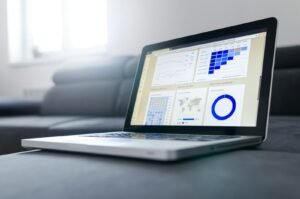Choosing between a laptop and a tablet for studying can be tricky. Both have their own strengths, depending on how you plan to use them. Laptops are often seen as more powerful, while tablets are light and easy to carry around.
With many students relying on technology for assignments, research, and online classes, finding the right device is important.
In this article, we’ll look at the key features of both laptops and tablets to help you decide which is best for studying.
Table of Contents
Toggle1. Portability and Convenience
When it comes to portability, tablets usually have the edge.
They are lighter, thinner, and easier to slip into a bag or carry around campus.
Many tablets can also run all day on a single charge, which is great for long study sessions without needing to recharge.
Laptops, while still portable, are often heavier and bulkier.
However, some ultra-thin laptops can compete with tablets in terms of convenience. Ultimately, tablets are easier to carry, but laptops offer more features.
2. Performance and Multitasking
Laptops are known for their powerful performance, making them better suited for tasks that require more computing power, like coding, graphic design, or video editing.
They can handle running multiple programs at once without slowing down.
Tablets, while fast enough for basic tasks like browsing, note-taking, or watching videos, can struggle with heavier workloads.
Multitasking on a tablet is possible with split-screen features, but it’s not as smooth as using a laptop.
For demanding tasks, laptops are the better choice.
3. Software and Compatibility
Laptops typically offer more flexibility when it comes to software.
They can run full versions of programs like Microsoft Office, Adobe Creative Suite, and many other applications used for schoolwork or specific courses.
Tablets, on the other hand, rely on apps from the App Store or Google Play, which are often more limited in features.
While tablets are great for basic tasks, they may not support specialized software needed for certain studies.
For broader software compatibility, laptops are the better option.
4. Typing and Productivity
Laptops are generally more comfortable for typing, especially when working on long essays or reports.
Their built-in keyboards offer more space, making typing faster and easier.
Tablets, while portable, often require an additional keyboard attachment, which might not be as comfortable for extended use.
However, tablets shine when it comes to using a stylus for note-taking or drawing, which can be a great tool for students in creative fields.
For traditional typing tasks, laptops are more productive.
5. Price and Affordability
Tablets are generally more affordable than laptops, especially for students on a budget.
You can find decent tablets at lower prices, making them a cost-effective option for basic tasks like browsing, reading, and note-taking.
However, if you need a device for more advanced tasks or specialized software, laptops provide better value for money in the long run.
While laptops tend to be pricier, they offer more features and power, making the investment worthwhile for students with demanding study needs.
6. Media Consumption and Entertainment
For media consumption, tablets tend to be more convenient. Their lightweight design makes them ideal for reading e-books, watching videos, or browsing the web on the go.
Tablets also have touchscreens, which make interacting with media more enjoyable and intuitive.
Laptops, however, offer a better overall experience for multitasking during media use, such as watching videos while working on an assignment.
Their larger screens and better speakers also provide a superior experience for both work and entertainment.
7. Durability and Maintenance
Laptops are generally more durable than tablets, especially when it comes to long-term use.
They are designed to handle more intensive tasks and can often be upgraded with better hardware, such as more memory or storage.
Tablets, while portable, are more prone to screen damage if dropped, and their internal components cannot be easily upgraded.
However, tablets are simpler to maintain, with fewer moving parts.
If you need a device that lasts and can be upgraded, a laptop is a better choice.
8. Comparison of Tablets vs. Laptops for Study
Comparison of tablets vs. laptops for study:
| Feature | Tablets | Laptops |
|---|---|---|
| Portability | Very portable – thin, lightweight, easy to carry | Less portable than tablets, but still easy to carry |
| Battery Life | Longer battery life than laptops | Shorter battery life compared to tablets |
| Versatility | Extremely versatile – can type with keyboard accessory, draw with stylus, dictate notes, take photos | Less versatile than tablets, but can still run advanced software |
| Simplicity | Simpler to use – focus on one app at a time without distractions | More complex to use with multiple programs open simultaneously |
| Price | More affordable than laptops, offering more value for the price | Generally more expensive than tablets |
| Screen Size | Smaller screen size than laptops | Larger screen size than tablets, better for productivity |
| Storage | Less storage space compared to laptops | More storage space than tablets, ideal for students doing research |
| Keyboard | Requires keyboard accessory, not built-in | Built-in keyboard and mouse/trackpad, enabling faster typing and easier navigation |
| Operating System | Runs mobile operating systems like iOS and Android | Runs full desktop operating systems like Windows and macOS, allowing installation of any software |
In summary, tablets are ideal for note-taking, reading, online classes, and basic tasks, while laptops are better for research, writing papers, coding, and running advanced software.
The choice depends on the student’s specific needs, budget, and preferences.
Conclusion
Both laptops and tablets have their strengths and weaknesses when it comes to studying.
Tablets are more portable, convenient, and affordable, making them ideal for students who need a simple, easy-to-carry device for note-taking, reading, and light work.
Laptops, on the other hand, offer more power, software compatibility, and productivity, especially for students who need to handle demanding tasks or type long assignments.
Ultimately, the choice depends on your study needs and budget, but laptops generally provide more versatility for most students.
Frequently Asked Questions (FAQs)
What is the Best Tablet or Laptop for Students?
Choosing between a tablet and a laptop depends on your study needs. Tablets are great for portability and ease of use, while laptops offer more power and versatility for complex tasks.
Which is Better, a Laptop or a Tablet?
Laptops are generally better for tasks that require more power, like writing papers and running software. Tablets are better for portability and simple tasks, like note-taking and reading.
Which Device is Best for Studying?
The best device for studying depends on your needs. Tablets are ideal for light tasks and mobility, while laptops are better for multitasking and intensive work.
Is it Good to Study on a Tablet?
Tablets can be good for studying if your tasks are simple, like reading or taking notes. They are portable and easy to use but may lack the power needed for more complex tasks.
Are Tablets Safer Than Laptops?
Both tablets and laptops have their own safety considerations. Tablets generally have fewer security issues due to their simpler operating systems, but laptops offer more robust security features for sensitive data.
Why is a Tablet Better Than a Laptop for Students?
Tablets are lighter, more portable, and often more affordable than laptops. They are ideal for on-the-go tasks and basic study needs.
Which Tablet is Best for Students?
The best tablet for students typically has a good balance of performance, battery life, and affordability. Popular choices include the iPad and Samsung Galaxy Tab.
Do Students Really Need a Tablet?
Students may not need a tablet if they already have a laptop that meets their needs. However, tablets can be useful for additional portability and ease of use for certain tasks.
Is a Tablet Better Than a Laptop for Reading?
Tablets are generally better for reading because of their lightweight and portable design, as well as their ability to easily display e-books and other digital materials.
Is a Laptop Better Than a Tablet for Eyes?
Laptops usually have larger screens that can be easier on the eyes during extended use, but both devices offer adjustable brightness settings to reduce eye strain.
Why Notebooks are Better Than Tablets?
Notebooks, or laptops, are better than tablets for tasks requiring extensive typing, multitasking, and running complex software. They also typically offer better storage and processing power.
Is a Tablet Better or Laptop for Medical Students?
Medical students may benefit more from a laptop due to its ability to handle extensive research, note-taking, and medical software. Tablets can complement a laptop but might not replace it entirely.
Which One is Best for Study: Tablet or Laptop?
The choice between a tablet and a laptop for studying depends on your specific needs. Laptops are generally better for extensive work, while tablets offer convenience for simpler tasks.
How Do I Choose Between a Laptop and a Tablet?
Consider your study needs: if you need a lot of power and multitasking capabilities, a laptop might be better. For portability and simple tasks, a tablet could be the right choice.
What is the Advantage of a Tablet vs. Laptop?
Tablets are lighter, more portable, and often more affordable. They are easy to use for reading, note-taking, and basic tasks. Laptops offer more power and versatility for complex work.
Which is Safer: Laptop or Tablet?
Both devices have their safety aspects. Tablets have simpler operating systems and fewer security risks, but laptops offer more robust security features and controls.
What are the Disadvantages of Tablets?
Tablets may have limited storage, less powerful performance for complex tasks, and fewer software options compared to laptops. They also typically require additional accessories for typing.
Can Tablets Replace Laptops?
Tablets can replace laptops for light tasks and portability, but they may not handle intensive work or software as effectively as laptops.
What is the Negative Side of Tablets?
Tablets can be less powerful, offer limited storage, and may require extra accessories for typing and productivity. They might not support all the software needed for certain tasks.
What is the Biggest Advantage of a Tablet?
The biggest advantage of a tablet is its portability and ease of use. They are lightweight, easy to carry, and great for simple tasks like reading and note-taking.
What are the Disadvantages of Using Tablets in the Classroom?
Disadvantages of tablets in the classroom include limited multitasking capabilities, less powerful performance for complex tasks, and potential distractions due to apps and games.
Is a Tablet Useful for Students?
Yes, a tablet can be useful for students who need a portable and simple device for reading, note-taking, and light research.
Are Tablets Good for Homework?
Tablets can be good for homework if the tasks are simple, like taking notes or reading materials. For more complex assignments, a laptop might be better.
Can a Tablet be Used for School Work?
Yes, tablets can be used for school work, especially for tasks like reading, taking notes, and accessing online resources.
Can I Study Online with a Tablet?
Yes, you can study online with a tablet. Tablets are well-suited for accessing online courses, reading materials, and participating in virtual classes.
What Device is Best for Google Classroom?
Both tablets and laptops can be used for Google Classroom. Tablets are great for quick access and portability, while laptops offer a better experience for extensive typing and multitasking.
Should College Students Have a Tablet?
College students might find a tablet useful for additional portability and ease of access to materials. However, having a laptop is generally more beneficial for handling complex tasks and extensive work.
References:
[1] https://www.croma.com/unboxed/tablets-vs-laptops-which-is-better-for-students
[2] https://www.asurion.com/connect/tech-tips/laptops-vs-tablets-which-is-better-for-your-student/
[3] https://www.companionlink.com/blog/2023/12/tablets-vs-laptops-which-device-is-ideal-for-students/
[4] https://www.cdw.com/content/cdw/en/articles/hardware/laptop-vs-tablet.html
[5] https://www.kelsercorp.com/blog/tablet-vs.-laptop-best-business-it-device
[6] https://byjus.com/gate/difference-between-laptop-and-tablet/
[7] https://www.digit.in/features/laptops/laptop-or-tablet-which-one-should-a-students-choose-31635.html
[8] https://www.geeksforgeeks.org/difference-between-laptop-and-tablet/
Also Read
7 Best ways to get Reliable Information about a Product
Which Laptop is Best for Cyber Security Students? Guide








Pingback: Which is Better Ipad or Tablet? - 2024